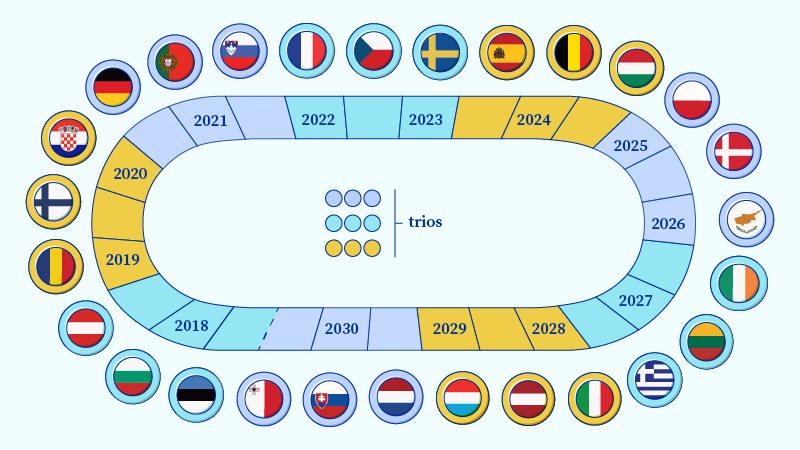All eyes on the upcoming Polish presidency of the Council of EU: a window of opportunity for a change in tech regulation
With the tumultuous Hungarian presidency of the Council of the EU slowly coming to an end, all eyes are now on the next — Polish one.

With the tumultuous Hungarian presidency of the Council of the EU slowly coming to an end, all eyes are now on the next — Polish one. As the largest and one of the most influential countries in Central Eastern Europe, Poland, which is typically unafraid to address uncomfortable topics, has an important window of opportunity ahead: to be more pragmatic, realistic, and, when necessary, skeptical about ideas that could impact the future of European competitiveness, strength, and geopolitical stance.
Priorities: 6 dimensions of security
Polish industry associations like ZPP have previously urged the Polish government to focus on 5 areas in tech: better monitoring of regulation, the development of cybersecurity, Digital Single Market, increased R&D spending (together with increased cooperation with like-minded countries), and support for the development of digital competencies.
It seems that the Government has listened at least to some extent - there’s only so much one can do in six months of the Presidency. The State Under Secretary in the European Union Affairs Division of the Polish Prime Minister's Office, Magdalena Sobkowiak-Czarnecka, recently outlined six main priorities for the Polish presidency, all aligned with a broader security-oriented approach.
Sobkowiak-Czarnecka stated in an interview for TVP World that Poland will focus on 1) military security, 2) energy security, 3) economic security, including decisions on the future of cohesion policy (a critically important issue for 'New Europe'), 4) food safety, 5) health (including the Pharmaceutical Act and the mental well-being of young people), and 6) information security and cybersecurity.
Naturally, EU enlargement will also be among Poland's key topics.
No to overregulation (but the next EU tech agenda is still regulation-heavy)
A strong emphasis is currently being placed on ensuring the Presidency remains cautious about introducing new regulations that could hinder innovation and European competitiveness.
Sobkowiak-Czarnecka also noted that one of the prioriteis for the Presidency will be to evaluate existing legislation to avoid overregulation, given that the EU has already adopted numerous regulations relevant to the ongoing digital transformation.
This was reinforced by the stance of Deputy Prime Minister and Minister of Digital Affairs Krzysztof Gawkowski, who recently stated that European tech innovators are struggling to comply with numerous new tech regulations, highlighting the need for policymakers to be cautious about the risks of overregulation
This commendable stance will require strong Polish spine, as the next European Commission tech agenda includes significant, large-scale changes, such as extending telecommunications regulations to digital services (see: to “ensure a level playing field”), reviewing and updating consumer protection laws to safeguard digital-age consumer rights (see: “digital fairness”), and addressing the future of CSAM (also referred to as #chatcontrol)—the EU’s legislative proposals to combat child sexual abuse online, which essentially will make a major shift in encryption as it exists today, among other initiatives. Poland (along with Germany) was one of the few countries that opposed the CSAM proposal from the outset.
While a serious discussion on some of these initiatives will extend into the second half of 2025 and beyond, Poland’s stance can also influence upcoming Presidencies—including tech and innovation-oriented Denmark in 2025 H2, Ireland in 2026 H1, Lithuania in 2027 H1, and Latvia in 2028 H2 (see picture below).

The next College of Commissioners is likely to be approved by early December. While Ursula von der Leyen outlined clear plans in her political guidelines to reduce administrative burdens, tangible red tape cuts are impossible without principal stance at all levels: the Commission, the European Parliament, and the Council of the EU.
Poland, as a central gathering point for smaller EU Member States across Central and Eastern Europe—through initiatives like the Three Seas Initiative and digital cooperation platforms such as the CEE Digital Coalition—understands better than most the challenges these smaller (and often - poorer) Member States face. Public administrations and local businesses in this region struggle not only to keep up with EU regulations but also to ensure that implementation does not harm business development and protects consumer interests and access to innovation.
Transatlantic cooperation: seek sovereignty from China, not the US
In 2023, Polish President Andrzej Duda, together with former Prime Minister Mateusz Morawiecki, highlighted the need for the Polish Presidency to work toward tighter cooperation with the United States:
"More United States in Europe, more European Union in the United States"
This line of thought seems to be maintained by the current Polish administration, with Sobkowiak-Czarnecka openly stating that the EU should prioritize competitiveness with China, rather than the United States.
We can only sincerely hope this focus can extend to tech cooperation. Rather than competing with each others' value chains via protectionist practices, the EU and the US should seek tangible reciprocity, aiming to complement rather than compete in a rapidly shifting global landscape.
This is especially relevant given that both China and Russia are actively promoting BRICS digital sovereignty and working to win hearts and minds (and, eventually, pockets) of the Global South.

